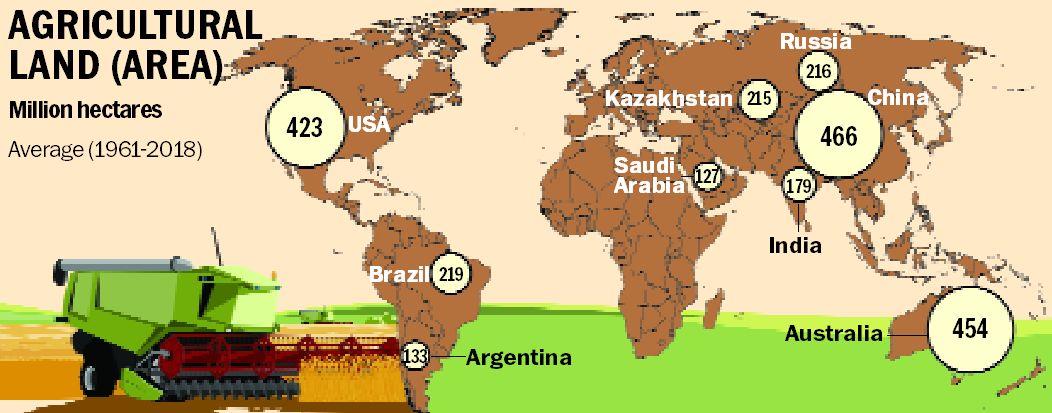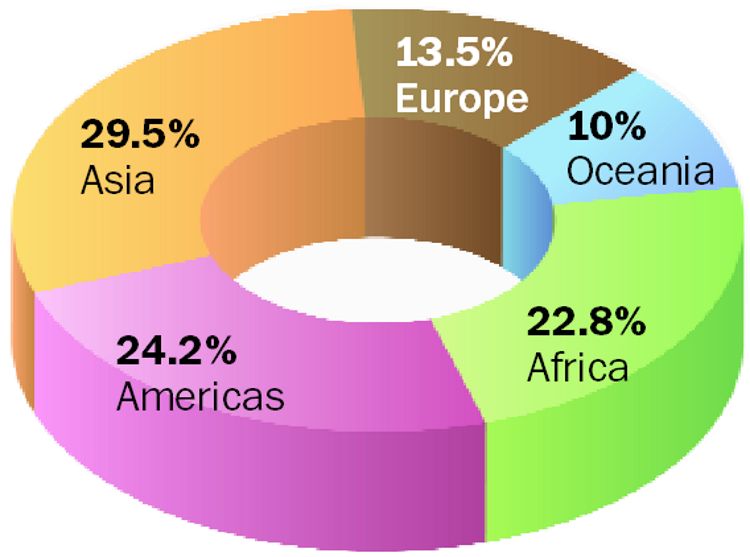
Continent-wise Agricultural land AVERAGE (1961- 2018). Source: faostat
Milkha Singh Aulakh
THE three farm laws enacted by the Union Government last year could have an enormous impact on the livelihoods of various sections of society as well as food security of our highly populated country. Policy-makers often cite the examples of developed countries to justify the need for such reforms in India to liberalise and open up the farm sector to private players. However, when we compare the social security net, insurance cover and market options available to farmers in India and developed countries, the disparity is striking.
Farmers and farm labourers constitute a smaller proportion of the population in developed countries (2-5 per cent) as compared to India (60-70 per cent). In the US, 897 million acres of agricultural land is cultivated by 2 million farmers; in India, only 350 million acres are cultivated by 145 million farming families. A majority of the farmers in developed countries have large-sized farms. The average farm size in the US is 448 acres, way above India (2.5 acres). Their farmers have the capacity and capability to store their products for long periods after each harvest; they also own transportation facilities. Their farmers are usually involved in decision-making policies that could impact their livelihood. In addition to a much larger cash and commodity support than in India, the government provides them social security, including old-age pension, health services and education to their wards (schoolbuses pick up and drop their wards at their on-farm residences). For example, the farmers of Manitoba, Saskatchewan and Alberta provinces in Canada have farms varying from 500 to 2,000 acres, along with modern machinery and infrastructure. They produce mainly wheat, barley, pulses and edible oilseeds that are exported to other countries. After each harvest, farmers often store grains in on-farm silos and transport them only when they get good prices.
 Farmers on board
Farmers on board
The Canadian Wheat Board was constituted in 1935 with representatives of the government and the farmers. Its functions include identification of markets, negotiations for best prices and delivery of agri products. Accordingly, the farmers grow those crops and transport their produce to allocated railway yards to upload it in containers for onward transport to seaports for export. If and when some fields are left fallow due to lesser demand of agri products, the government compensates farmers for their fallow acreage.
Contract farming under India’s new agri laws would lead to the establishment of large farms and the development of state-of-the-art infrastructure by clubbing landholdings of small, marginal and poor farmers, who have less than five acres and constitute 86 per cent of the farmers. However, such large farms would render rural people unemployed, who account for 60-70 per cent of our population. Keeping in view the joblessness of a significant proportion of the urban population, the movement of people in large numbers from rural areas to cities would aggravate unemployment. In order to avoid unnecessary glut of one agri product or the other and maintain equilibrium between their production and requirements, the state governments and farmers’ cooperatives could be allowed to export their agri products, including fresh vegetables and fruits, directly to other countries.
Insurance schemes
In India, several crop insurance schemes have been formulated, implemented and withdrawn from time to time. In 1999-2000, the government introduced Rashtriya Krishi Bima Yojana. In recent years, four insurance schemes were launched: Pradhan Mantri Fasal Bima Yojana, Weather-based Crop Insurance Scheme, Coconut Palm Insurance Scheme and the Pilot Unified Package Insurance Scheme. However, none of these schemes has become popular among farmers because their premium rates are quite high, and they have several inbuilt bylaws for calamities and other factors that are mostly unfavourable to the farmers. For example, while more than 11 lakh policies were purchased by farmers in 2017, only 3.08 lakh were indemnified. Other reasons for their non-acceptance are the complicated procedures involved, lack of education and awareness among farmers, and most importantly, the incapability and affordability of poor farmers to pay the annual premium in advance.
In contrast, the farmers of developed countries are in a better position in several ways and capable of paying premium. A variety of insurance policies are available at competitive rates, which cover personal liability of farmers and their co-workers, their farmhouses and possessions, machinery and livestock, and stored-on-farm agri products, besides the insurance for crops that witness a loss in yield, whether it is due to an insurable cause of loss in the quality or quantity of the insured crop. Governments co-pay substantial premiums; for instance, in British Columbia province of Canada, the government pays up to 45 per cent of the crop insurance premium. Moreover, the system is transparent and farmers use insurance policies to cover the risk and make a profit.
MSP shield
The Union Government introduced the MSP (minimum support price) regime to guarantee a minimum profit for the farmer for his harvest if the open market offers a lesser price than the cost incurred. Although the MSP is announced for 23 farm-produced crops, the Centre does not assure that all these agri products are purchased at or above the MSP. The Centre purchases mainly paddy (unmilled rice), wheat and a few pulses through the Food Corporation of India (FCI) and state government agencies for their distribution among poor people through the Public Distribution System (PDS). This leaves the farmers at the mercy of corporates (including private buyers), who may purchase all remaining agri products at whatever price they offer, and farmers have no option but to sell their produce.
As the MSP holds the key to farmers’ security and the nation’s self-sufficiency, the provision of its legal status is a necessity so that no one can swindle, fleece or force poor farmers, who are already in a pitiable condition, to sell their agri products at much lower than economically viable rates. This would also encourage crop diversification so as to avoid a glut of wheat and rice, and reduce imports of pulses and edible oils.
In a nutshell, we should either adopt reforms of developed countries in totality, including liberalisation in agriculture and agri-marketing, social security and crop insurance, as selective actions can distort our well-established system and prove counterproductive, or try to frame our own viable and dynamic agricultural policies that will provide economic and ecological sustainability and protect the interests of various sections of the population.
The author is former Dean, College of Agriculture, PAU, and founder V-C, Banda
University of Agriculture and Technology, UP
Send your feedback to [email protected]
Join Whatsapp Channel of The Tribune for latest updates.



























